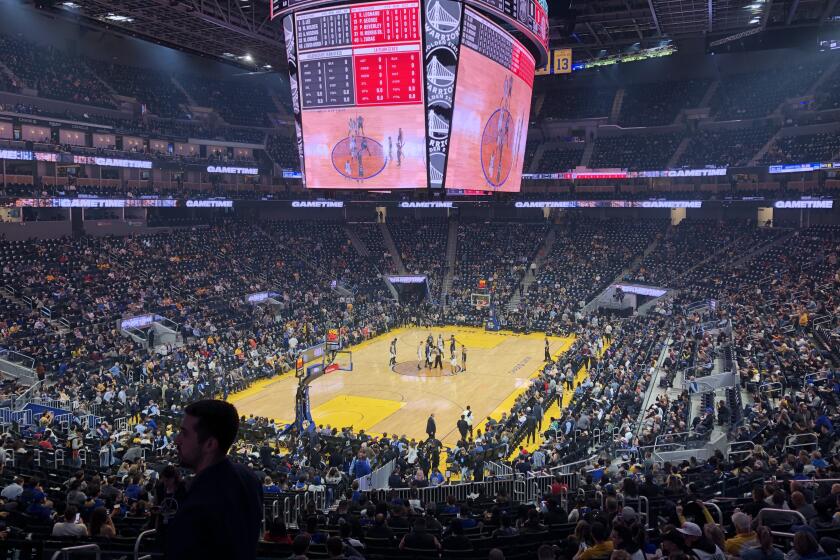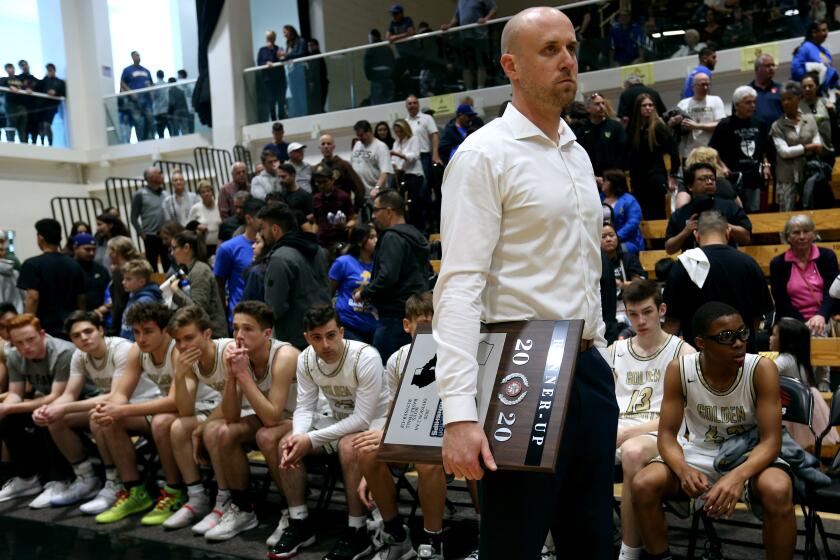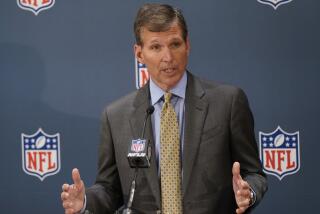The day L.A. sports died: Teams adapt, move forward after shockingly swift shutdown
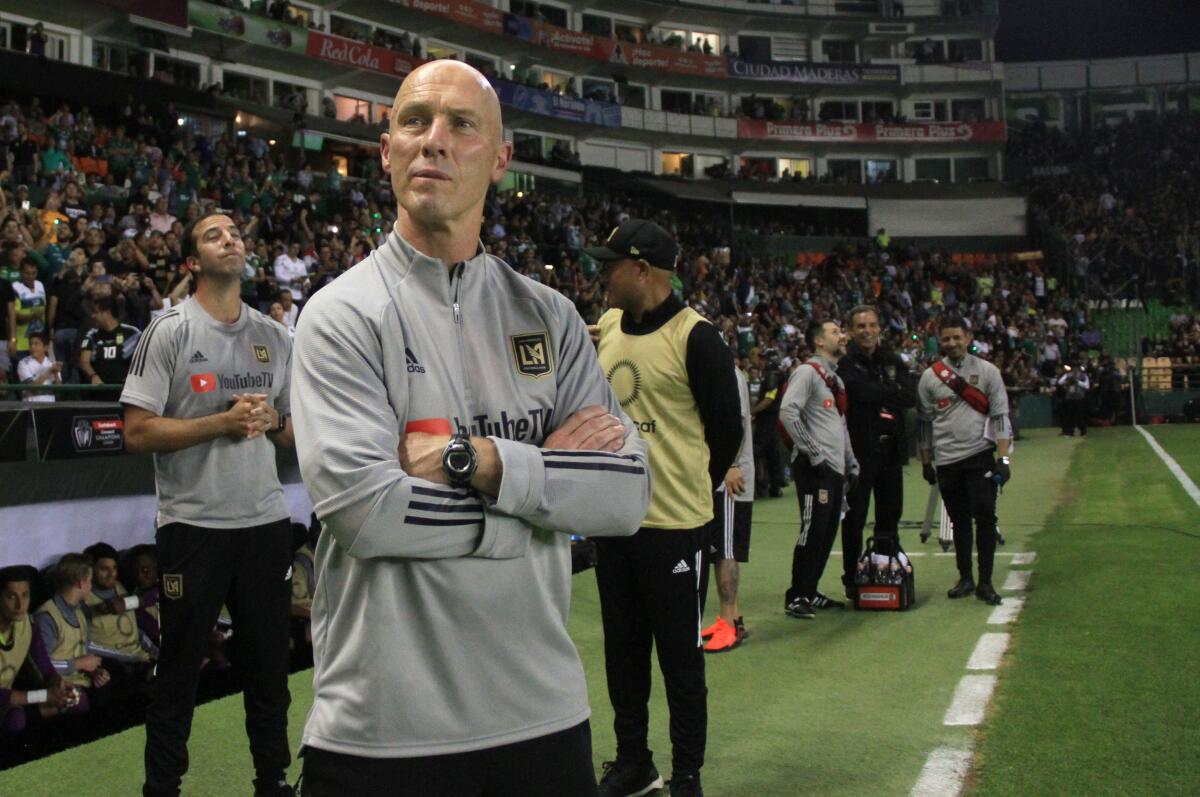
- Share via
Luc Robitaille learned his life was about to change from Twitter.
It was a year ago, March 11, and Robitaille was between periods of a hockey game at Staples Center when he looked down at his phone: The NBA had become the first U.S. sports league to stop play because of the coronavirus.
The Kings president knew it wouldn’t be the last.
“Once you’ve heard that pro leagues were postponing their seasons, you’re like, ‘Wait a minute,’” Robitaille said. “None of us had ever seen anything like it.”
That Wednesday night, shortly before the Kings faced off with the Ottawa Senators, LAFC coach Bob Bradley attended a news conference a few miles away at Banc of California Stadium, hyping the next day’s game with Mexico’s Cruz Azul. His life changed after he got back to his South Bay home and learned actors Tom Hanks and Rita Wilson had tested positive for COVID-19 in Australia.
“That was the night I always think back to,” Bradley said.
Within hours, Gov. Gavin Newsom called for gatherings of more than 250 people to be canceled, effectively banning spectator sports in the state. The following morning, the NHL, Major League Soccer and college basketball shut down. NASCAR announced it would race without fans, Major League Baseball suspended spring training and the LAFC-Cruz Azul game was canceled.
The shutdown of the NBA because of the COVID-19 pandemic forced teams to adapt innovative ways to conduct business. A look at some of those changes.
There hasn’t been a fan at a sporting event in Southern California since.
“I remember having the thought that this could be our last game this year,” Robitaille recalled of leaving the arena after the Senators game. The lockdown, it seemed, might last a month or two.
“I never thought it would be like this. Never.”
On the day the cheering stopped, 198 Californians had tested positive for the coronavirus and one person had died from it. A year later, there have been more than 3.61 million infections and more than 54,000 deaths statewide.
Now the state is gradually reopening, allowing a limited number of people back in theme parks and outdoor stadiums beginning April 1. High school football teams are finally kicking off their long-delayed seasons Friday night.
Dr. Armand Dorian, interim chief executive of USC Verdugo Hills Hospital, says more challenges loom for sports teams and their fans.
“We’re on a tightrope,” he said.
The rise of variants is worrisome, and he said more people still need to be vaccinated.
“So it is a dance. It just has to be done the right way,” Dorian said. “We’re so close.”
The World Health Organization announced the coronavirus outbreak had become a pandemic on March 11, 2020. Since then, the virus has seemingly touched all aspects of life in Southern California and beyond. The Times looks back on a full year of life in a pandemic.
Bradley sees other numbers. Nearly one in five Californians, including the coach and his wife, Lindsay, have been vaccinated. Infections have been falling for nearly two months. Hospitalizations are way down.
If this were a soccer game and not a pandemic, Bradley would be predicting a big second-half comeback.
“People are looking at all those numbers, and based upon what they see in the current trends, they’re thinking that we’re moving in the right direction,” he said. “So we’ll see.”
No one knew when the Kings took the ice against the Senators that it would be Southern California’s last sporting event with fans for more than a year. But enough people were worried about the virus that just 12,030 — by far the smallest crowd of the year — showed up.
“The night felt strange,” Kings coach Todd McLellan said. “It didn’t feel like a normal game.”
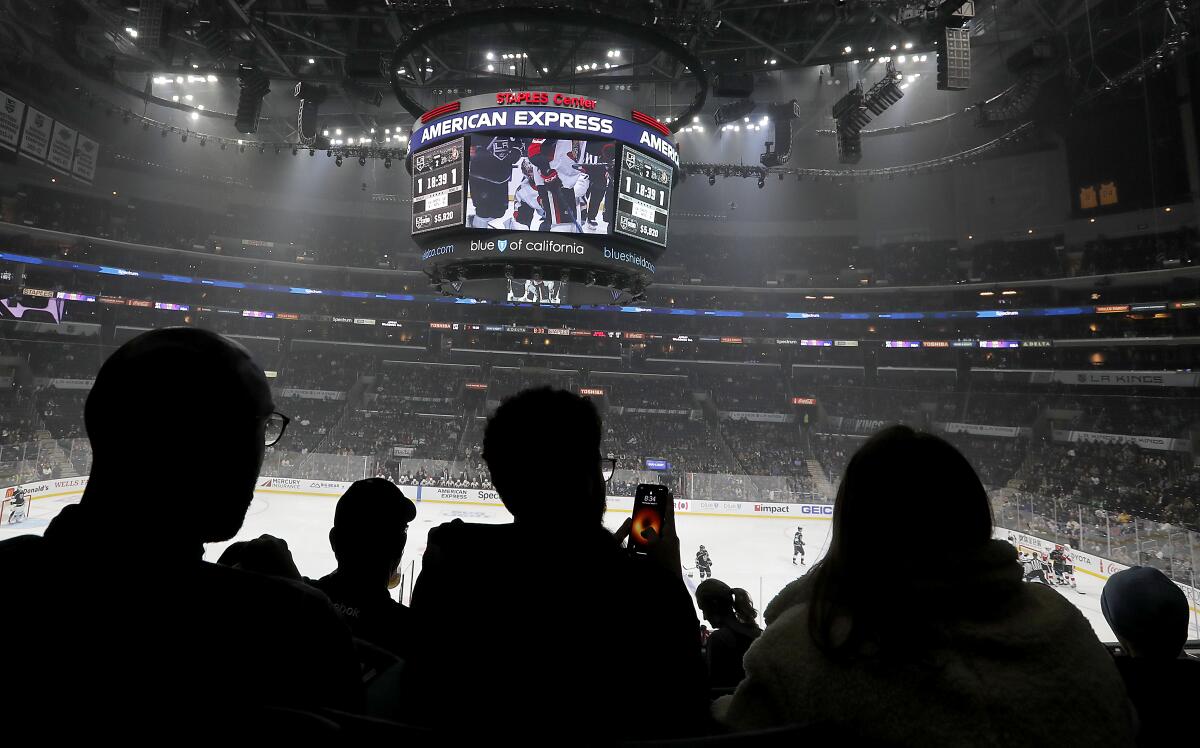
In the dressing room, news — ominous news — began seeping in. President Trump had limited travel to Europe. Rudy Gobert of the Utah Jazz, who that week had made light of COVID-19, tested positive for the virus and his team’s game in Oklahoma City was called off.
“It’s not the best feeling, obviously, to go into the game and see NBA games getting canceled,” Kings captain Anze Kopitar said.
Distracted, the Kings gave up a goal just 29 seconds into the game. In Robitaille’s perch high above the ice, the severity of the situation quickly became apparent.
“We were talking about what are we going to do? How’s it going to work?” he recalled. “Once this kind of sunk in, we’re like, this is bigger than anything we’ve ever seen.”
Before he could get back to the Staples Center the following morning, the NHL had suspended the season.
After living most of his life as a slave to the NHL schedule, Robitaille, 55, suddenly had a lot of unwanted free time on his hands. But it’s been instructive.
“I’ve gotten better at fixing things at home,” he said. “There’s definitely a feeling of don’t sweat as much the small stuff because at any time our world can change.”
Bradley woke up Thursday morning, March 12, to find out one of the biggest games in his club’s three seasons — a quarterfinal match in the CONCACAF Champions League — was called off.
“We were reading every day about COVID. But we were all still trying to understand it,” he said. “None of us listened enough to the experts, who for years said that a pandemic was possible.”
Bradley’s team had trained as normal that Wednesday, and he attended a stadium news conference with goalkeeper Kenneth Vermeer. But the team wouldn’t train together as a team again until June; the game with Cruz Azul was played 279 days later in Orlando, Fla.
Steve Jarrard, a Hollywood prop man who has season tickets for both of Southern California’s MLS teams, had already decided he and his girlfriend, Meg Wallace, would skip that game.
High school sports have resumed after the COVID-19 shutdown. Here is how it touched aspects of athletes’ lives, from school to training to recruiting.
“We felt like this stuff’s real and we need to be careful,” he recalled. “People we’re laughing at us because we bought Clorox wipes and gloves and all that sort of thing in February.”
So when the entire MLS season was shut down, they weren’t surprised.
“We had planned on not seeing a game in person. Because I understood historically what these pandemics are like,” Jarrard said. “We knew that we were going to hunker down.”
A year later, they haven’t changed their minds despite the governor’s blessing. They won’t be in the stands when first LAFC, then the Galaxy, welcome fans back next month.
“We just don’t feel safe going,” said Jarrard, 66, who has received the first dose of the Pfizer vaccine. “We’re probably a minority about that sort of thing. We’re going to be hyper-conscious.”
For Bradley, the cancellation of the March 12 game, which came about a half hour after MLS had paused its season, quickly changed his focus from the routine to the unprecedented. Coaches are leaders, and now he had a new leadership role.
“There were so many unanswered questions,” he said. “The learning curve, reading, trying to get good information. That’s all necessary in order to be able to play a role in guiding people around you.”
Bradley, 63, had tread unknown ground before. Seven years earlier, as coach of the Egyptian national team, he kept his players safe and focused during a time of bloody political and civil unrest in their country. Egypt’s domestic league was shut down and the national team was forced to play on the road or in empty stadiums at home, yet it narrowly missed qualifying for its first World Cup in nearly three decades.
It may have been the best coaching job in Bradley’s Hall of Fame career.
Get our high school sports newsletter
Prep Rally is devoted to the SoCal high school sports experience, bringing you scores, stories and a behind-the-scenes look at what makes prep sports so popular.
You may occasionally receive promotional content from the Los Angeles Times.
“Look, I’ve always tried to have perspective. But perspective of people in this world and their situation,” he said. “The biggest challenge as a leader is you’re trying so hard to understand and be empathetic. Understanding the challenges of everyone in this situation. Families. Loneliness.
“And yet somehow, you’re trying to say, ‘Come on, we’ve got to push ourselves.’”
Southern California may be in a similar place with its COVID-19 comeback.
“This pandemic has created psychological and psychiatric conditions that have happened on so many levels, from the depression of being alone, the anxiety of being afraid to go out, loneliness, boredom,” Dorian said. “Now we’re at the point where there’s the sights and smells of what it once was. And sports is one of those key factors of our normal life. So those things are real. There’s a value to that for society.”
He added: “We know how we can reintroduce fans, but how confident [are] we that we can reintroduce fans the right way?”
We may soon find out. In Texas, where many coronavirus restrictions have been lifted, baseball’s Texas Rangers said they will put all 40,518 seats at Globe Life Park on sale for next month’s season opener. California’s reopening will be more gradual and tied to each county’s COVID-19 numbers.
Los Angeles and Orange counties are expected to move to the red tier, the second-most-restrictive level ,on Friday, meaning outdoor sports venues will be limited to 20% capacity. Fans will still be banned for indoor sports such as basketball and hockey.
“Maybe we can push that envelope,” said Dorian, a self-avowed Dodgers and Lakers fan. “But I don’t think it’s going from zero to hero immediately.”
“It is a little bit safer,” he continued. “We know what we’re dealing with. But the potential of spreading the infection is real. The next couple of months, if we can get past this without that variant showing up, we’re going to be talking about COVID like, ‘Man, that was a horrible year.’ ”
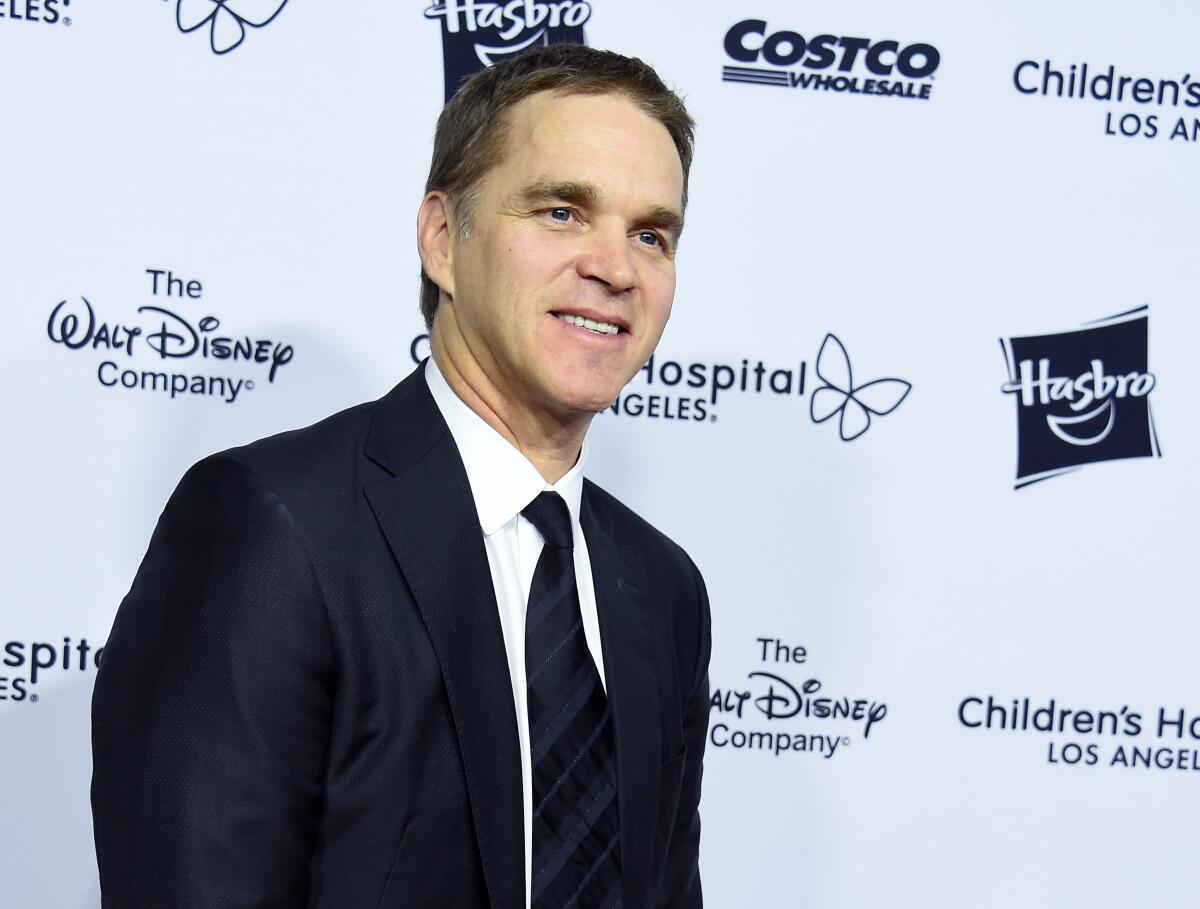
A year that began for Robitaille with a life-changing tweet in an half-empty hockey arena might now finally be ending with a story he can tell his grandkids.
“No, you can’t go back [like] this never happened,” he said. “I remember my hearing my grandpas, they would talk about World War II and what it did. I have a feeling we’ll be grandparents talking about COVID-19.
“This is one of the biggest — the biggest — thing that ever happened to me for sure. Maybe in the entire planet. So I don’t see us being the same.”
Staff writer Jack Harris contributed to this report.
More to Read
Go beyond the scoreboard
Get the latest on L.A.'s teams in the daily Sports Report newsletter.
You may occasionally receive promotional content from the Los Angeles Times.

